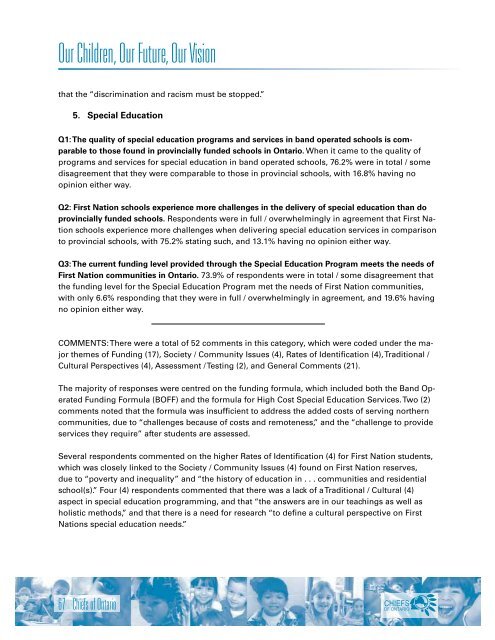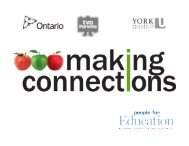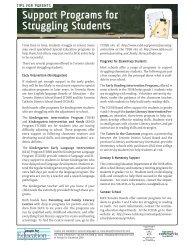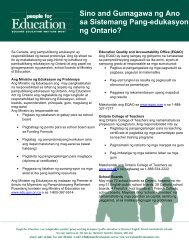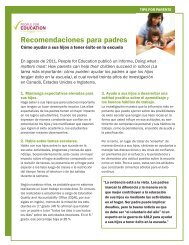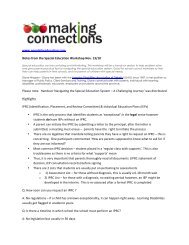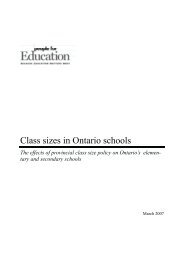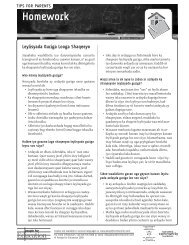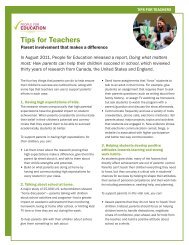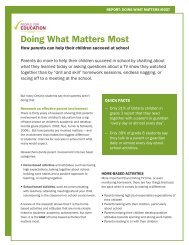Our Children Our Future Our Vision - People for Education
Our Children Our Future Our Vision - People for Education
Our Children Our Future Our Vision - People for Education
Create successful ePaper yourself
Turn your PDF publications into a flip-book with our unique Google optimized e-Paper software.
<strong>Our</strong> <strong>Children</strong>, <strong>Our</strong> <strong>Future</strong>, <strong>Our</strong> <strong>Vision</strong><br />
that the “discrimination and racism must be stopped.”<br />
5. Special <strong>Education</strong><br />
Q1: The quality of special education programs and services in band operated schools is comparable<br />
to those found in provincially funded schools in Ontario. When it came to the quality of<br />
programs and services <strong>for</strong> special education in band operated schools, 76.2% were in total / some<br />
disagreement that they were comparable to those in provincial schools, with 16.8% having no<br />
opinion either way.<br />
Q2: First Nation schools experience more challenges in the delivery of special education than do<br />
provincially funded schools. Respondents were in full / overwhelmingly in agreement that First Nation<br />
schools experience more challenges when delivering special education services in comparison<br />
to provincial schools, with 75.2% stating such, and 13.1% having no opinion either way.<br />
Q3: The current funding level provided through the Special <strong>Education</strong> Program meets the needs of<br />
First Nation communities in Ontario. 73.9% of respondents were in total / some disagreement that<br />
the funding level <strong>for</strong> the Special <strong>Education</strong> Program met the needs of First Nation communities,<br />
with only 6.6% responding that they were in full / overwhelmingly in agreement, and 19.6% having<br />
no opinion either way.<br />
COMMENTS: There were a total of 52 comments in this category, which were coded under the major<br />
themes of Funding (17), Society / Community Issues (4), Rates of Identification (4), Traditional /<br />
Cultural Perspectives (4), Assessment / Testing (2), and General Comments (21).<br />
The majority of responses were centred on the funding <strong>for</strong>mula, which included both the Band Operated<br />
Funding Formula (BOFF) and the <strong>for</strong>mula <strong>for</strong> High Cost Special <strong>Education</strong> Services. Two (2)<br />
comments noted that the <strong>for</strong>mula was insufficient to address the added costs of serving northern<br />
communities, due to “challenges because of costs and remoteness,” and the “challenge to provide<br />
services they require” after students are assessed.<br />
Several respondents commented on the higher Rates of Identification (4) <strong>for</strong> First Nation students,<br />
which was closely linked to the Society / Community Issues (4) found on First Nation reserves,<br />
due to “poverty and inequality” and “the history of education in . . . communities and residential<br />
school(s).” Four (4) respondents commented that there was a lack of a Traditional / Cultural (4)<br />
aspect in special education programming, and that “the answers are in our teachings as well as<br />
holistic methods,” and that there is a need <strong>for</strong> research “to define a cultural perspective on First<br />
Nations special education needs.”<br />
67 Chiefs of Ontario


